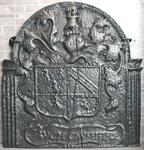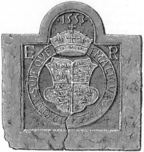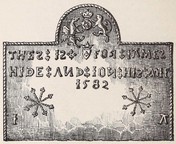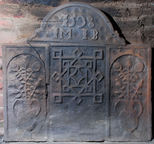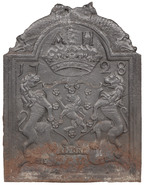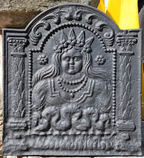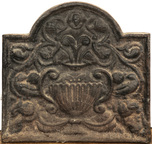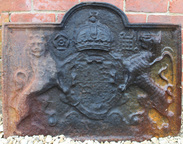-
1272
Description: Arched rectangular shape with side pilasters; cavetto-moulded edging to the arch; quartered shield with an, off-centre, knight's helm, wreath and mantling, and crest of a cubit arm vested, or habited, cuffed and erased holding an arrow in bend sinister; the shield has, in the 1st quarter three lions rampant, in the 2nd a bend cotised, in the 3rd possibly a lion rampant, and in the 4th possibly a dragon rampant within a bordure indented; motto below the shield.
Notes: From the style of the mantling the pattern carver may have also been responsible for other firebacks from the west Midlands or Welsh border area.
Copies of this fireback are known.
Inscription: SVCH CAVSE I FIND
Arms: Not known
- Decoration tags:
- rectangular with round arch (shape)
- cavetto (edging)
- whole carved pattern
- heraldic
- armorial
- text
Manufactured: in the early- to mid-17th century in England.
Current location: Littlehampton Museum, Manor Road, Littlehampton, West Sussex, England.
Museum number: A263 (part of the Littlehampton Museum museum group)
- Attached to series:
- Herefordshire armorial series
- Personal armorial firebacks
-
467
Description: Arched rectangular with plain edges; arched rectangular inset with cavetto edging and armorial design in low relief: circular garter enclosing an ornate Tudor royal shield, surmounted by a crown; date inside top of arch; initials inside top corners of rectangle
Notes: Discovered by Mr Anthony Hill of the Plymouth ironworks, Glamorgan, in the 1820s, and believed by David Mushet, in his 'Papers on Iron and Steel' to have been cast at the early furnace on the opposite side of the River Taff; a variant of the same date (no. 288) has an inscription on the bottom panel and roses in relief at the bottom corners of the rectangle, which may have been obliterated by fire damage on this casting, the drawing showing it how the artist thought it might have looked originally. The west country source for both of these firebacks offers the possibility of an origin in those parts.
Inscription: HONV SOIT QVE MALE V [illegible]
Arms: Tudor royal - Edward VI
- Decoration tags:
- rectangular with round arch (shape)
- none (edging)
- whole carved pattern
- armorial
- royal
- text
Manufactured: in 1553 .
Current location: not known.
Citation: Mushet, D., 1840, Papers on Iron and Steel (London, John Weale), p. 393.
- Attached to series:
- Edwardian royal armorial firebacks
- Tudor royal armorial firebacks
-
474
Description: Fragment; arched rectangular shape with rounded corners; ovolo within fillet moulding all round; oval Tudor royal shield with garter surrounding, topped with a royal crown; dragon and greyhound supporters; initials split by crown; inscription on a fillet between legs of supporters, behind garter finial; motto on an Ionic plinth at bottom; left hand rectangular extension panel with twisted rope edging on top and side: initials in top left corner, ‘dragon’s head’ in top right corner, rose-en-soleil stamp in centre, rose stamp bottom centre.
Notes: The letters on the extension panel are the same form and size as those on the top of the armorial pattern, indicating that they were added to the armorial, perhaps to indicate a change of reign. The letter 'E' has also been noted on another fireback of the same series. The rose-en-soleil was the badge of King Edward IV and, thus, a Yorkist symbol; it is seen on other firebacks. From a house in Chailey, Sussex. Illustration from Lower (1849).
Inscription: E R / E / R / HONY SOIT QUE MAL Y PAYNCE / Made in Sussex by John Harvo / DV ET MOVN DR...
Arms: Tudor royal
- Decoration tags:
- rectangular with round arch (shape)
- complex individual (edging)
- carved stamps
- whole carved pattern
- individual letters
- armorial
- royal
- text
- animals
- plants
Manufactured: in the mid- to late-16th century in the Weald area of England.
Current location: not known.
- Attached to series:
- Pounsley series
- John Harvo series
- Rose-en-soleil series
-
473
Description: Arched rectangular shape; twisted rope edging (top and sides); in arch; rose and crown with dragon and lion supporters, above a fleur cross and a crowned shield bearing a small fleur-de-lys; text across top half, each word separated by two fleur terminals; lower left and right, twice repeated eight-pointed star design formed of twisted rope with fleur-de-lys terminals; bottom left, ‘I’; bottom right, ‘A’.
Notes: A James Hide married Joan Blackefane at Horley, Surrey on 11th October 1579; illustrated in Lower, 1849 p. 217, when it was at Sutton Hurst, Barcombe, Sussex (still there in 1893, house since demolished). One of a small series of distinctive firebacks cast in 1582, most with inscriptions dedicated to pairs of individuals; the initials IA may be of the founder as they appear in the same arrangement on other firebacks; the rose and crown and supporters stamp can also be seen on a large fireback, dated 1593, formerly at Baynard's Park, Surrey (no. 200).
Inscription: THES : IS FOR IAMES : / HIDE : AND : ION : HIS : WIF [W inverted] / 1582 / I A
- Decoration tags:
- rectangular with round arch (shape)
- rope (edging)
- carved stamps
- individual letters
- individual numbers
- heraldic
- text
- objects
Manufactured: in 1582 possibly at Pounsley Furnace, Framfield in the Weald area of England.
Current location: not known.
- Attached to series:
- Pounsley series
- 1582 IA series
- Fleur rope terminal series
- Fleur-de-lys firebacks
-
475
Description: Composite of three elements; central panel has a complex ‘knot’ pattern with a fillet edge; side panel, repeated on either side of the central panel, contains a vase of flowers, possibly stylised thistles, within an arched frame and fillet edge; arched panel above, also with fillet edge, contains the date and inscription; the spandrels of the side panels, and the arched top panel, contain a series of 'bullseye' motifs comprising concentric rings deepening towards the centre.
Notes: One of an unusual series formed from separate panels arranged, in this instance, with the outer panel repeated.‘Knot’ patterns were popular in gardens of the period. The garden theme is continued with the side panels. A version of the same design, recorded in a photograph of 1904 at Willesden, London, is a different casting, the top panel with the date and initials, being straight not slightly askew as in this example.
Inscription: 1598 / IM IB
- Decoration tags:
- rectangular with round arch (shape)
- astragal (edging)
- carved pattern panels
- text
- plants
- objects
Manufactured: in 1598 in the Weald area of England.
Current location: in private hands, Linchmere, West Sussex, England.
- Attached to series:
- Armada series
- Garden design types
-
870
Description: Arched rectangular shape with ovolo-moulded edging and narrow extensions to sides; central shield bearing arms with lion rampant supporters and motto scroll beneath; above, a marquesal coronet; date split between top corners; inserted initials above coronet; on top of arch, two downward facing dolphins with tails entwined.
Notes: The arms are of the family of Henry Pierrepont, marquess of Dorchester and earl of Kingston-upon-Hull, of Thoresby Hall, Nottinghamshire (blazon: argent semi of cinquefoils gules, a lion rampant sable), with the motto: Pie Repone Te (Place yourself piously), a pun on the name, Pierrepont. Confusingly, the marquisate of Dorchester was created twice for members of the same family. In 1645 it was created for Henry Pierrepont, 2nd earl of Kingston-upon-Hull, becoming extinct on his death without surviving male issue in 1680. It was created again for Evelyn Pierrepont, the 5th earl of Kingston in 1706 who was subsequently elevated to the dukedom of Kingston in 1715. The original casting may therefore have dated to between 1645 and 1680 or between 1706 and 1715. The initials may be related to the Halls, the 2nd Duke of Kingston's mother's family, and were probably added with the date in 1728. Woolley & Wallis auction, Salisbury, 8 Jul 2014, lot 518 (£250); Lyon and Turnbull auction, Edinburgh, 1 Sep 2021, lot 10.
Copies of this fireback are known.
Inscription: A H / 17 28 / PIE REPONE TE
Arms: Pierrepont, Marquess of Dorchester
- Decoration tags:
- rectangular with round arch (shape)
- ovolo (edging)
- whole carved pattern
- individual letters
- armorial
- text
Manufactured: in 1728 in England.
Current location: not known.
- Attached to series:
- Personal armorial firebacks
- Pierrepont series
-
477
Description: Arched rectangular shaped central panel, bead edging, bust of female figure with long hair and eastern crown decorated with flowers; arched rectangular shaped border with fillet edging; leafed, Corinthian column on each side with symmetrical swirls of foliage above and a row of acanthus leaves below.
Notes: The figure is that of the Virgin, part of the arms and crest of the Mercers’ Company: Issuant from a Bank of clouds a Figure of the Virgin couped at the shoulders proper, vested in a crimson robe adorned with gold, the neck encircled by a jewelled necklace, crined Or and wreathed about the temples with a chaplet of Roses alternately Argent and of the first, and crowned with a Celestial Crown. The arms were first recorded in 1568. One of a small series of firebacks with similar proportions and detail.
Copies of this fireback are known.
- Decoration tags:
- rectangular with round arch (shape)
- cavetto (edging)
- whole carved pattern
- pictorial
- allegorical
- humans
Manufactured: in the mid- to late-17th century in England.
Current location: Maidstone Museum, St Faith's Street, Maidstone, Kent, England.
(part of the Maidstone Museum museum group)
- Attached to series:
- Carolean 'Dutch' series
- Livery company firebacks
-
480
Description: Arched rectangle; ovolo, egg-and-dart moulded edging; shield, helm, coronet, crest and mantling; curved inscription panel below shield.
Notes: The heraldic devices on the shield, and the form of the helm and crest suggest this may be a continental achievement of arms; the style of the fireback is, however, is more characteristic of English types.
Copies of this fireback are known.
Inscription: ... D HADRIANI ... EQVITE DOM DE HE.. / ... M.. ... ... [?]
Arms: not known
- Decoration tags:
- rectangular with round arch (shape)
- egg and dart (edging)
- whole carved pattern
- planklines
- armorial
- text
Manufactured: in the early-17th century .
Current location: Maidstone Museum, St Faith's Street, Maidstone, Kent, England.
(part of the Maidstone Museum museum group)
- Attached to series:
- Personal armorial firebacks
-
1189
Description: Arched rectangular shape; cavetto-moulded edging; central, two handled, gadrooned vase with swirled, fruited vines issuing from the neck, and a bird on each side perched within the vines; out of the neck, a naïve human figure with arms outstretched, grasping vines on each side.
Notes: The figure emerging from the vase has a symbolism which has yet to be explained; more than one version of this fireback exists. Mallams auction, Abingdon, 28 Jun 2023, lot 219 (£60). Copies of this fireback were advertised in Kings Worthy Foundry's (Winchester) catalogue in the mid-20th century.
Copies of this fireback are known.
- Decoration tags:
- rectangular with round arch (shape)
- cavetto (edging)
- whole carved pattern
- animals
- humans
- plants
- objects
Manufactured: in the mid-17th century in the Weald area of England.
Current location: not known.
- Attached to series:
- Gadrooned vase firebacks
-
1016
Description: Arched rectangular shape; ovolo-moulded edging; Tudor royal shield within a cartouche, garter, crown, motto and supporters (crowned lion and dragon); Tudor rose to right of lion’s head, portcullis to left of dragon’s head.
Notes: The cartouche enclosing the shield is an unusual feature. A recasting. Mallam's auction, Abingdon, 9 Aug 2014, lot 1208 (£100).
Inscription: Garter and Royal mottoes [not legible]
Arms: Tudor royal (prob. Elizabeth I)
- Decoration tags:
- rectangular with round arch (shape)
- ovolo (edging)
- whole carved pattern
- armorial
Manufactured: in the mid- to late-16th century in England.
Current location: not known.
- Attached to series:
- Tudor royal armorial firebacks
